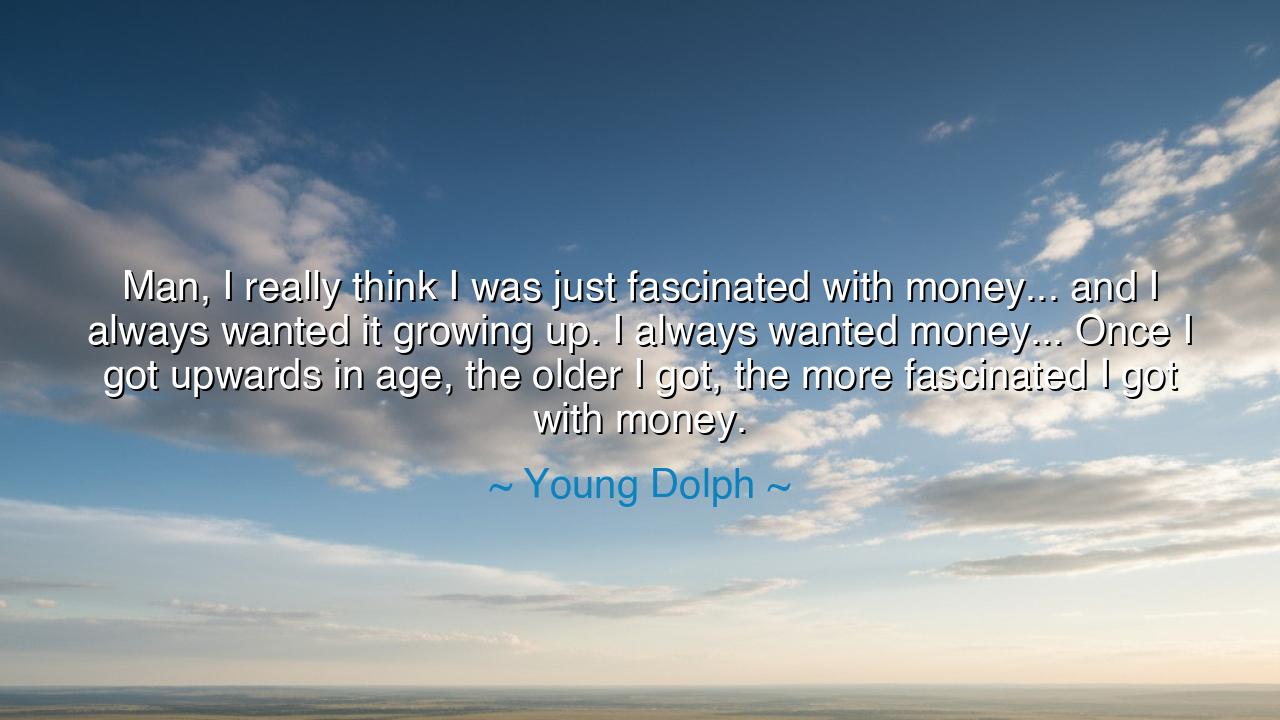
Man, I really think I was just fascinated with money... and I
Man, I really think I was just fascinated with money... and I always wanted it growing up. I always wanted money... Once I got upwards in age, the older I got, the more fascinated I got with money.






“Man, I really think I was just fascinated with money... and I always wanted it growing up. I always wanted money... Once I got upwards in age, the older I got, the more fascinated I got with money.” — Young Dolph
Thus spoke Young Dolph, the modern poet of the streets, whose voice carried both the hunger of survival and the rhythm of ambition. In these words, he unveils a truth forged in the fire of struggle — the human fascination with wealth, not as greed, but as a symbol of freedom. To want money, in the world from which he came, was not to crave luxury for its own sake; it was to long for security, to dream of a life unshackled by scarcity. Money, to the poor and the overlooked, becomes not mere currency, but the promise of dignity, the power to shape one’s own destiny.
Young Dolph’s fascination with money was the reflection of a generation raised in hardship, where the glitter of success gleamed not from vanity but from the will to overcome. To grow up watching struggle — to see mothers stretching every dollar, to witness dreams deferred by poverty — is to see money as the language of deliverance. It becomes a kind of faith, a belief that if one can only gather enough, one might buy back lost time, mend broken futures, and silence the world’s doubt. His confession is thus not one of greed, but of yearning — the sacred fire that drives men to rise from nothing and prove that they, too, are worthy of abundance.
The ancients, too, knew this hunger for security, though they spoke of it in other forms. The philosopher Epicurus taught that men do not truly desire wealth itself, but the peace it promises. Yet, he warned, when the pursuit of riches becomes endless, it ceases to free and begins to enslave. Here lies the paradox within Young Dolph’s reflection — that the deeper one gazes into the glitter of money, the more it becomes both a blessing and a burden. What begins as fascination can grow into obsession; what begins as survival can become identity. Thus, the wise must learn not only how to earn wealth, but how to rule it.
Consider the story of Mansa Musa, the legendary king of Mali, who became known as the richest man in all history. His empire overflowed with gold, yet he was remembered not merely for his wealth, but for how he used it — to build schools, mosques, and cities, to nourish both body and spirit. He understood what many forget: that money, though powerful, is a tool, not a god. It cannot fill the emptiness of the soul, but it can shape the world when guided by purpose. In this way, Mansa Musa stands as a mirror for Young Dolph’s wisdom — the understanding that fascination with wealth must evolve into mastery of it.
In the words of Young Dolph, there is also a deeper recognition — that age brings not only success but awareness. As he grew older, his fascination with money became more complex, more reflective. What once symbolized escape became a meditation on legacy. For as the years pass, the wise come to see that wealth without meaning fades swiftly, like smoke in the wind. The truest riches are not what we possess, but what we build and leave behind — the opportunities we create, the families we sustain, the communities we uplift.
And yet, his confession remains profoundly human. There is no shame in desiring wealth when one has known want; there is no sin in ambition when it springs from survival. The danger lies only in forgetting that money is a servant, not a master. The wise man does not curse gold, nor does he worship it — he harnesses it for good. The true fascination, then, should not be with money itself, but with the freedom and creation it allows. To control wealth without letting it control the heart — that is the art of balance that turns ambition into wisdom.
Practical counsel for the seeker:
-
Let your desire for wealth be guided by purpose, not pride.
-
Remember that money is power, but power must be tempered by compassion.
-
Seek not only to earn, but to elevate — yourself, your family, your people.
-
And when prosperity comes, use it to build, to teach, and to heal — for that is how the rich become great.
For as Young Dolph teaches through his reflection, fascination can be the beginning of greatness if it leads to discipline and vision. To hunger for wealth is natural; to be consumed by it is perilous. The wise will learn, as he did, that the measure of a man is not how much he gains, but how deeply he understands the power he holds. Thus, may all who chase gold remember: the truest treasure is not what fills the hands, but what fills the soul.






AAdministratorAdministrator
Welcome, honored guests. Please leave a comment, we will respond soon